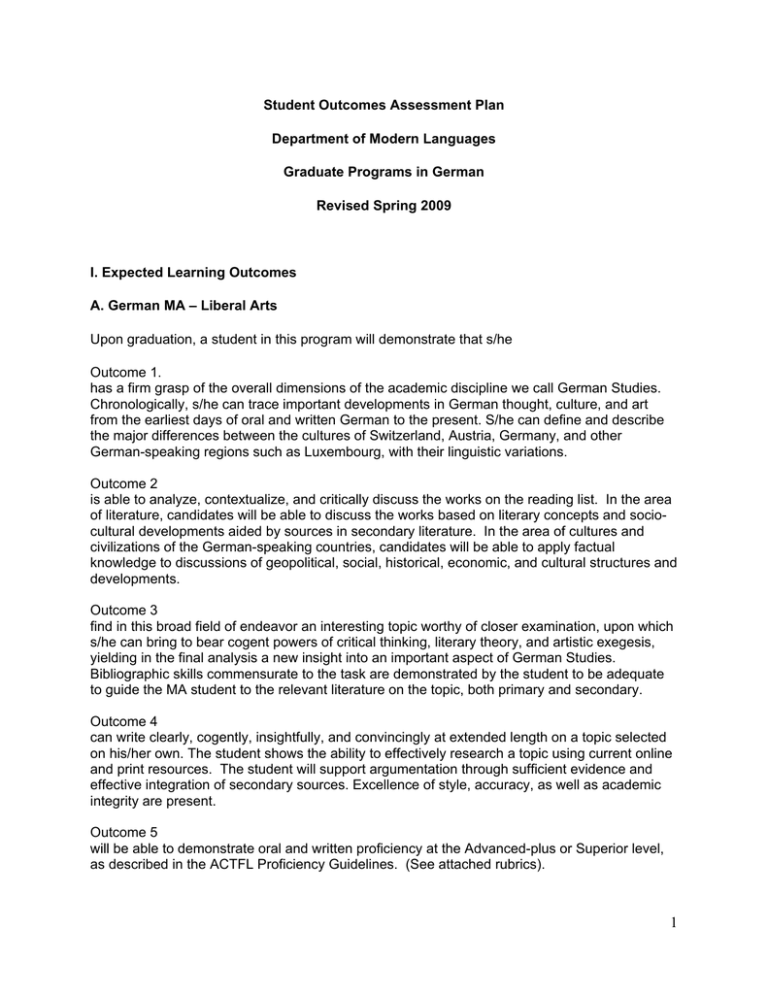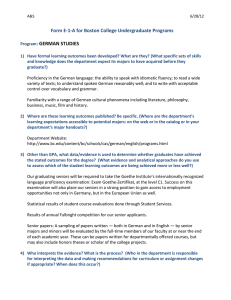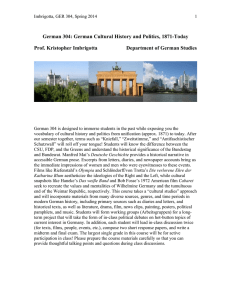Document 12439627
advertisement

Student Outcomes Assessment Plan Department of Modern Languages Graduate Programs in German Revised Spring 2009 I. Expected Learning Outcomes A. German MA – Liberal Arts Upon graduation, a student in this program will demonstrate that s/he Outcome 1. has a firm grasp of the overall dimensions of the academic discipline we call German Studies. Chronologically, s/he can trace important developments in German thought, culture, and art from the earliest days of oral and written German to the present. S/he can define and describe the major differences between the cultures of Switzerland, Austria, Germany, and other German-speaking regions such as Luxembourg, with their linguistic variations. Outcome 2 is able to analyze, contextualize, and critically discuss the works on the reading list. In the area of literature, candidates will be able to discuss the works based on literary concepts and sociocultural developments aided by sources in secondary literature. In the area of cultures and civilizations of the German-speaking countries, candidates will be able to apply factual knowledge to discussions of geopolitical, social, historical, economic, and cultural structures and developments. Outcome 3 find in this broad field of endeavor an interesting topic worthy of closer examination, upon which s/he can bring to bear cogent powers of critical thinking, literary theory, and artistic exegesis, yielding in the final analysis a new insight into an important aspect of German Studies. Bibliographic skills commensurate to the task are demonstrated by the student to be adequate to guide the MA student to the relevant literature on the topic, both primary and secondary. Outcome 4 can write clearly, cogently, insightfully, and convincingly at extended length on a topic selected on his/her own. The student shows the ability to effectively research a topic using current online and print resources. The student will support argumentation through sufficient evidence and effective integration of secondary sources. Excellence of style, accuracy, as well as academic integrity are present. Outcome 5 will be able to demonstrate oral and written proficiency at the Advanced-plus or Superior level, as described in the ACTFL Proficiency Guidelines. (See attached rubrics). 1 B. German MA -Teaching Emphasis The German MA program with an emphasis on teachers prepares teachers to strengthen and expand their linguistic proficiency skills in German, their knowledge about the German-speaking societies, their historical developments and cultural manifestations. Students will learn to select and apply modern methods to meet the varying instructional needs of students of German as a foreign language. Students in the program are expected to: Outcome 1 write effectively, both technically and in terms of the field-appropriate style of analysis and argumentation; Outcome 2 demonstrate content knowledge with associated analytical skills in FL methods and second language acquisition; Outcome 3 identify and select teaching and assessment practices in accordance with current FL methodologies Outcome 4 align teaching goals with language proficiency standards in the profession Outcome 5 demonstrate knowledge of professional organizations, journals, conferences, resources, networking opportunities among the teaching profession Outcome 6 demonstrate academic integrity and ethical behavior, conduct in a professional manner. II. Evidence of Learning / Assessment Methods Direct Measures 1. Students demonstrate their having met the outcomes stated above through course-level assessment tools including oral and written exams, research papers and other academic writing projects, as well as oral presentations. [mid-program assessment] 2. Comprehensive Written Exam: Student’s demonstrate their ability transfer knowledge and to synthesize information acquired in numerous courses on language, literatures, and cultures as related to the discipline of German Studies. [at program completion] Method of assessment for the written exam: template measuring critical thinking skills (see attached rubrics) 2 3. Comprehensive Oral Exam: Assessment of language skills based on national standardized ACTFL Proficiency Guidelines 4. M.A. Research Paper: The research paper demonstrates the student’s ability to apply acquired knowledge and professionalism, and such skill as critical and creative thinking, information literacy, inquiry and analysis within the context of the discipline. It is the ultimate measure of the student’s success. [at program completion] Method of assessment: template measuring advanced writing and research skills (see attached rubrics). Indirect Measures [post-graduating assessment] 1. Exit interview. 2. Alumni tracking survey. 3. Graduate placement. We track our students’ admissions and acceptances to Ph.D. programs and if possible, their subsequent career choices and work in the profession. (Adapted from German MA Program at Brigham Young University) III. Frequency of Assessment Upon entrance of program. Students will complete a diagnostic language proficiency exam administered by the graduate advisor. Mid-program. Students will have completed between 15 and 18 hours of credit hours in the program. Samples of course exams, oral work, writing projects, and research-based papers in German will be collected by the course instructor. At program completion. MA research paper and comprehensive written exam of each student are collected, assessed, and retained in the department. The oral exam is conducted and assessed by three faculty members. Post-graduation. Departmental survey taken every other year of graduates five years out. 3 Assessment Rubric for M.A. Research Paper UNI German Graduate Program Please see hard copy of grading rubrics modeled after UC Davis English Program Objectives 1. Addresses a clear and manageable question or problem in the field of German Studies. 2. Articulates a clear thesis statement or analytic argument in relation to that problem and sustains it throughout the paper 3. Locates the topic within the key debates and literature in the field of German Studies. 4. Describes the research methodology clearly. That is, indicates what constitutes the principal data or evidence of the work, how the data was collected (from primary or secondary sources), and how it was used to address the central research question. 5. Draws on relevant sources and/or data to systematically develop the project’s central argument with supporting evidence. 6. Concludes with insightful and possibly original contributions to address the paper’s central question or problem. 7. Is written in a style that reflects professional and/or graduate-level standards and contains a correctly and consistently formatted bibliography. Pass with Distinction is granted to those candidates whose performance is superior or extraordinary in all of the above areas and is in the top 5% of former and current students. Additional guidelines that might be helpful are: • The student showed extraordinary initiative and originality during the project. • The student’s performance in the working session was superior. High Pass is awarded to students whose MA project is good in all the above areas. A Final Project that is outstanding in a few of the above areas, but not in most or all, should be awarded a High Pass rather than Pass with Distinction. Pass is awarded to those MA final Projects that are adequate, but not up to the standards of High Pass. This includes MA projects that may be good in a few of the above areas but only adequate in the others. MA projects earning Pass may be characterized by: Acceptable research but writing quality and style do not consistently reflect graduate-level standards. Acceptable presentation of MA project but significant (and correctable) problems in argumentation or research Adequate content and writing but that lacking in depth or originality Student need extensive supervision and support from faculty reader A need for significant revisions, which must be approved by the faculty reader, or one that did not take into account feedback provided by faculty reader. A weak performance in the working session with faculty reader Fail is for work that is unacceptable Adapted from Dept. of International Development and Social Change at Clark University 4 MA Final Project Evaluation Checklist Initiative and Selfdirection X Pass with Distinction X High Pass X Pass X Fail Ideas / Topic Quality and Originality X Pass with Distinction X High Pass X Pass X Fail Support / Evidence and Analysis X Pass with Distinction X High Pass X Pass X Fail Organization and Coherence X Pass with Distinction X High Pass X Pass X Fail Style X Pass with Distinction X High Pass X Weak X Fail Writing Mechanics X Pass with Distinction X High Pass X Pass X Fail 5 Critical Thinking Scoring Guide Interpretation Skills 4 Relevant/penetrating questions clarify facts, concepts, and relationships. Questions are insightful and go beyond the obvious. Detects sources of bias even subtle or well-disguised. Uses principles of logic to explain fallacies in “if/then” statements. Identifies inconsistencies in language, data, images, or symbols and discusses the possible intent and/or consequences in terms of how the information will be interpreted. 3 Asks relevant/penetrating questions to clarify facts, concepts, and relationships. Detects sources of bias such as use of leading questions designed to elicit a preferred response or slanted definitions or comparisons. Detects “if, then” statements based on false assumptions. Recognizes contradictions or inconsistencies in language, data, images, or symbols. 2 Questions raised about facts, concepts, or relationships are not thoughtful or are unlikely to provide significant information. Detects some sources of bias but neglects other significant elements. May recognize faulty “if/then” statements but form an Analysis, Evaluation Skills Accurately identifies the main conclusion of an argument; determines if the conclusion is supported with adequate reasons. Develops and uses criteria for making judgments that are reliable, relevant, and intellectually strong. Uses a variety of sources and weighs competing evidence carefully before drawing conclusions or forming judgments. Analysis/evaluation is intellectually careful and precise. While minor errors in analysis may be made, identifies the main conclusion of an argument, determines if the conclusion is supported with reasons, and determines whether an argument makes sense. Evaluates the credibility, accuracy, and reliability of sources; seeks independent sources of evidence, rather than a single sources. Develops and uses relevant, reliable criteria for making judgments. Significant errors are made in identifying the main conclusion of an argument, determining whether the conclusion is warranted, or determining whether the argument makes sense. Presentation Skills Presents argument clearly and succinctly, capturing the most important points related to the issue. Presents the audience with a thorough and relevant discussion of supporting reasons and evidence for conclusion(s). Exhibits intellectual honesty in recognizing their prejudices or biases and seeks to address them directly. Open-minded; strives to understand other viewpoints. Presents an argument clearly, conveying important points related to the issue. Presents supporting reasons and evidence for conclusions which address the concerns of the audience. Fairly weighs opposing points of view; is open minded in considering the findings on an inquiry even when they may not support one’s own opinions. Makes revisions in arguments/findings when self-examination reveals inadequacies. Presentation is difficult to follow. While some understanding important points related to the issue is apparent, the argument is not developed logically in the presentation. Opposing 6 incorrect conclusion about the source of error. Recognize some contradictions/inconsistencies in language, data, images, or symbols but misses others or fails to recognize inconsistencies within a particular category. 1 Questions are not used to clarify facts, concepts, or generalizations. Seems oblivious to obvious sources of bias and/or faulty “if/then” statements. Fails to detect contradictions/inconsistencies in language, data, images, or symbols. Limited or inappropriate sources are used in gathering support for a conclusion or the “evidence” provided in the source(s) is misinterpreted. Evaluative criteria are poorly developed, lack relevance and/or are unreliable. Overall, analysis lacks intellectual precision. Fails to identify the main conclusion of an argument; forms incorrect conclusions about the validity of the argument. Bases conclusions on a single source of evidence. Unclear what, if any, evaluative criteria are used in forming judgments. points of view are mentioned but examination is “pro forma; arguments/findings which conflict with own interpretation are given little credence even when additional consideration is warranted. Fails to give adequate consideration to divergent points of view. Presentation of argument is unclear; fails to convey important points related to the issue. Presents little or no supporting evidence. Own biases/opinions are presented as “truth.” Lacks intellectual integrity/rigor. Adopted from California State University, Fresno 7 Critical Thinking Skills – Scoring Template Interpretation Skills 4____Pass with Distinction 3____High Pass 2____ Pass 1 ____Deficiencies Analysis, Evaluation Skills 4____Pass with Distinction 3____High Pass 2____Pass 1____Deficiencies Presentation Skills 3____Pass with Distinction 3____High Pass 2____Pass 1____Deficiencies 8 ASSESSMENT RUBRICS FOR LANGUAGE PROFICIENCY MA Comprehensive Written Exams UNI German Graduate Program ACTFL guidelines: Speaking--Advanced General Description The Advanced level is characterized by the speaker's ability to: • • • • converse in a clearly participatory fashion initiate, sustain, and bring to closure a wide variety of communicative tasks, including those that require an increased ability to convey meaning with diverse language strategies due to a complication or an unforeseen turn of events satisfy the requirements of school and work situations, and narrate and describe with paragraph-length connected discourse. Advanced Able to satisfy the requirements of everyday situations and routine school and work requirements. Can handle with confidence but not with facility complicated tasks and social situations, such as elaborating, complaining, and apologizing. Can narrate and describe with some details, linking sentences together smoothly. Can communicate facts and talk casually about topics of current public and personal interest, using general vocabulary. Shortcomings can often be smoothed over by communicative strategies, such as pause fillers, stalling devices, and different rates of speech. Circumlocution which arises from vocabulary or syntactic limitations very often is quite successful, though some groping for words may still be evident. The Advancedlevel speaker can be understood without difficulty by native interlocutors. Advanced Plus Able to satisfy the requirements of a broad variety of everyday, school, and work situations. Can discuss concrete topics relating to particular interests and special fields of competence. There is emerging evidence of ability to support opinions, explain in detail, and hypothesize. The Advanced-Plus speaker often shows a welldeveloped ability to compensate for an imperfect grasp of some forms with confident use of communicative strategies, such as paraphrasing and circumlocution. Differentiated vocabulary and intonation are effectively used to communicate fine shades of meaning. The Advanced-Plus speaker often shows remarkable fluency and ease of speech, but under the demands of Superior-level complex tasks, language may break down or prove inadequate. 9 ACTFL guidelines: Speaking--Superior Distinguishing characteristics The Superior level is characterized by the speaker's ability to: • • participate effectively in most formal and informal conversations on practical, social, professional, and abstract topics support opinions and hypothesize using native-like discourse strategies. Description Able to speak the language with sufficient accuracy to participate effectively in most formal and informal conversations on practical, social, professional, and abstract topics. Can discuss special fields of competence and interest with ease. Can support opinions and hypothesize, but may not be able to tailor language to audience or discuss in depth highly abstract or unfamiliar topics. Usually the Superior level speaker is only partially familiar with regional or other dialectical variants. The Superior level speaker commands a wide variety of interactive strategies and shows good awareness of discourse strategies. The latter involves the ability to distinguish main ideas from supporting information through syntactic, lexical, and suprasegmental features (pitch, stress, intonation). Sporadic errors may occur, particularly in low-frequency structures and some complex high-frequency structures more common to formal writing, but no patterns of error are evident. Errors do not disturb the native speaker or interfere with communication. 10 ACTFL guidelines: Writing--Advanced Advanced Able to write routine social correspondence and join sentences in simple discourse of at least several paragraphs in length on familiar topics. Can write simple social correspondence, take notes, write cohesive summaries and resumes, as well as narratives and descriptions of a factual nature. Has sufficient writing vocabulary to express self simply with some circumlocution. May still make errors in punctuation, spelling, or the formation of nonalphabetic symbols. Good control of the morphology and the most frequently used syntactic structures, e.g., common word order patterns, coordination, subordination, but makes frequent errors in producing complex sentences. Uses a limited number of cohesive devices, such as pronouns, accurately. Writing may resemble literal translations from the native language, but a sense of organization (rhetorical structure) is emerging. Writing is understandable to natives not used to the writing of non-natives. Advanced Plus Able to write about a variety of topics with significant precision and in detail. Can write most social and informal business correspondence. Can describe and narrate personal experiences fully but has difficulty supporting points of view in written discourse. Can write about the concrete aspects of topics relating to particular interests and special fields of competence. Often shows remarkable fluency and ease of expression, but under time constraints and pressure writing may be inaccurate. Generally strong in either grammar or vocabulary, but not in both. Weakness and unevenness in one of the foregoing or in spelling or character writing formation may result in occasional miscommunication. Some misuse of vocabulary may still be evident. Style may still be obviously foreign. ACTFL guidelines: Writing--Superior Description Able to express self effectively in most formal and informal writing on practical, social and professional topics. Can write most types of correspondence, such as memos as well as social and business letters, and short research papers and statements of position in areas of special interest or in special fields. Good control of a full range of structures, spelling or nonalphabetic symbol production, and a wide general vocabulary allow the writer to hypothesize and present arguments or points of view accurately and effectively. An underlying organization, such as chronological ordering, logical ordering, cause and effect, comparison, and thematic development is strongly evident, although not thoroughly executed and/or not totally reflecting target language patterns. Although sensitive to differences in formal and informal style, still may not tailor writing precisely to a variety of purposes and/or readers. Errors in writing rarely disturb natives or cause miscommunication. ACTFL Proficiency Guidelines by the American Council for the Teaching of Foreign Languages. 11



